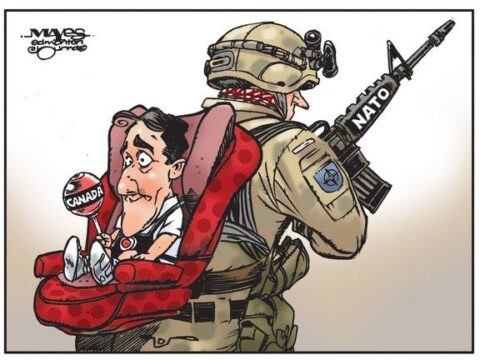In The Line, Vincent Rigby discusses Canada’s notable lack of any kind of strategy to cope with an international situation that seems to be changing (or deteriorating, take your pick) at a rapid pace:
On the foreign policy front, the Canadian government unveiled its long-awaited Indo-Pacific Strategy almost a year ago. It was a welcome development for Canada’s role in a region at the epicentre of global events. But it was remarkably light on security and is now under severe stress given the serious diplomatic falling-out with India. But more importantly, where is Canada’s broader foreign policy? What will we do in other parts of a turbulent world to protect our security and values? How will we balance regional priorities? Canada has not produced a comprehensive foreign policy statement in 18 years.
On the defence front, Canada unveiled a new policy, Strong, Secure and Engaged, in 2017. After the Russian invasion of Ukraine, the government committed in April 2022 to produce an update to that policy in the following months. A year and a half later, Canadians are still waiting. In the meantime, officials have spoken publicly of possible cuts to the defence budget of $900 million a year over four years as part of broader government spending reductions. A severely stretched military may soon be stretched even further.
On the home front, Canada continues to lurch from crisis to crisis — the Freedom Convoy with its populist underpinnings, Chinese interference in federal elections, possible Indian complicity in the murder of a Canadian citizen, and now tension at home over the fighting in the Middle East. More than ever, Canada’s large diaspora communities feature prominently in security and foreign policy discussions. While Canadians await the findings of yet another public inquiry into the China affair, a broader strategy to confront national security threats is nowhere to be seen. Canada has not produced a national security policy in 19 years.
To be fair, the government has not sat idle during recent global developments. For example, it has ramped up its support to Ukraine (notwithstanding a slow start and the recent embarrassment in the House of Commons), taken measures to improve economic security, and established a National Security Council. But these efforts are all too often modest, piecemeal and reactive.
A Canadian senator famously quipped nearly a century ago that Canada was “a fireproof house far from inflammable materials”. It was barely true in the 1920s, and it is even less so today. But Canadians, despite all recent evidence to the contrary, apparently still believe this to be the case. They assume that the threats are not aimed at Canada, and that the U.S. would come to their rescue regardless. On both counts, such assumptions are dangerous, especially if Donald Trump were to return as president. The government, echoing the indifference of most Canadians, chooses to focus on domestic priorities, from increasing affordable housing to improving health care to fighting inflation. All are undeniably important. But as every prime minister declares, the government ultimately has no greater responsibility than the security of its citizens.
Canada needs an integrated, coherent strategy (or strategies), supported by appropriate resources and capabilities, to respond effectively both at home and overseas to this new world order. It will require trade-offs, but the case needs to be made to Canadians that the generation-long, post-Cold War peace dividend is no longer on offer. Our allies get that — so too must Canada. In the absence of such strategy, the security of Canadians will deteriorate further, and relationships with key NATO and Five-Eyes allies, already in peril, will suffer even more. If not careful, Canada may find itself more alone in the world than ever.




